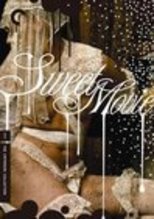On the eve of my departure to the West Coast for some undisclosed beer drinking, I take with me a fresh copy of the new Criterion DVD of Dusan Makavejev’s classic anti-authoritarian film "Sweet Movie." I clearly remember seeing it at the Roxie Cinema in San Francisco in the late ’80s, and this banned film is a doozy of a political comedy. It premiered in Cannes in 1974 as the follow up to Makavejev’s "WR: Mysteries of the Organism," a bright black comedy loosely based around Wilhelm Reich’s theories on sexual liberation.
In "Sweet Movie," Makavejev dares to ask the existential
question, "Is there life after birth?" and sets out to prove the limitations of desire.Oh, I can’t wait to watch this one again.






